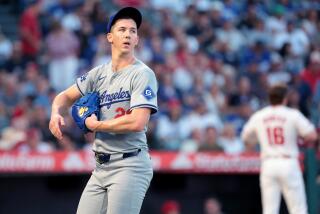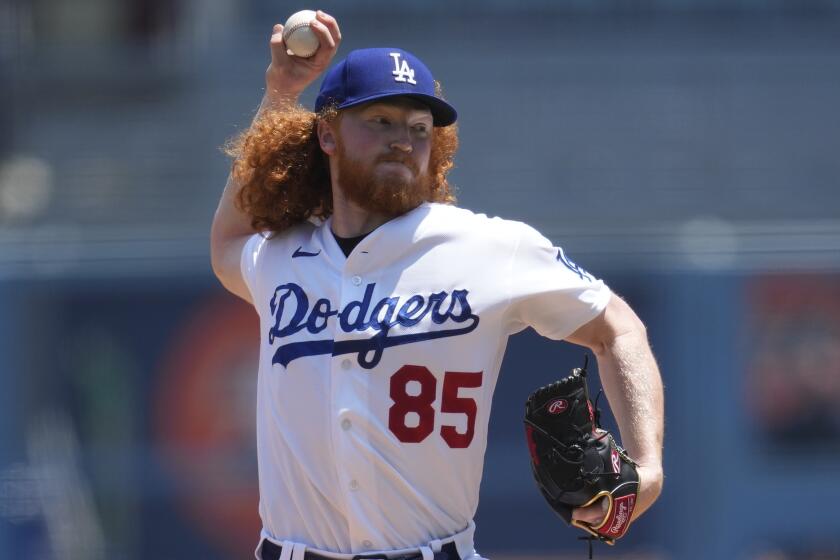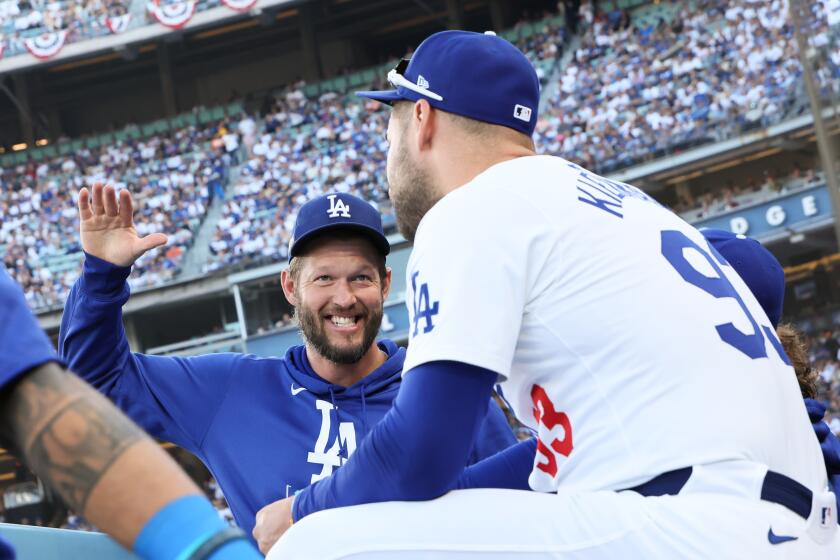Shouldn’t They at Least Make Effort to Keep Park?
Does saying hello Daal-y mean Chan Ho’s gotta go?
Sure looks that way.
The Dodgers looked to be bracing for life without Chan Ho Park when they traded two prospects to the Philadelphia Phillies for Omar Daal.
The Dodgers now have six pitchers who started last season, plus injured Darren Dreifort, plus the possibility of re-signing James Baldwin. The numbers don’t add up for Park, even though the numbers should be in his favor.
He pitched at least 220 innings in three of the past four seasons. He had an earned-run average of 3.71 or less in three of the last four seasons.
How exactly would the Dodgers be better off without him?
Players and Manager Jim Tracy were quick to publicly blast Park after a sub-standard effort. But you didn’t hear Park running to the media to complain about lack of run support or the bullpen blowing leads.
It was almost as if Park was being set up to be the scapegoat, when he wasn’t what was wrong with the Dodgers.
Here’s what’s wrong with the Dodgers, at least when it comes to this issue: The Dodgers essentially chose Dreifort over Park.
Instead of locking up Park to a long-term contract last year for what probably would have been favorable amount, they did a quick one-year deal with him so they could focus on giving a five-year $55-million contract to Dreifort, who had been nowhere near as consistent.
Next year the Dodgers are due to pay Dreifort $11 million, even though he won’t be back from elbow surgery until August at the earliest. The one-year option for Daal that Philadelphia picked up before trading him will come to $5million. If the Dodgers can pay those two a combined $16 million, I would rather give $16 million to Park instead if that would be enough keep him around.
Yes, that’s Michael Jordan money for a guy who will probably never be more than Scottie Pippen. But it’s better than paying for a couple of Luc Longleys.
If Park received a more lucrative offer somewhere else, then pat him on the back and bid farewell. But after bidding against themselves for Kevin Brown and Dreifort--and helping to drive up the market in the process--the Dodgers now appear willing to fold their cards before anyone else has even stepped to the table.
Of course, it’s past the either/or stage for Dreifort and Park now. They can’t rescind Dreifort’s contract, and good luck trying to trade it. New General Manager Dan Evans is operating in the mess Kevin Malone created. (And it will take a long time to clean up; in 2005, barring trades or buyouts the Dodgers will be paying $15 million to a 40-year-old Brown and $13 million to Dreifort).
But it’s Evans’ show from here on.
“I developed an off-season plan with our staff prior to the World Series,” Evans said. “I decided which way I wanted to go. I wanted to do some things to improve our ballclub. I want to go forward with it.”
Evans went forward with this deal without gauging what it would take to sign Park.
“I’ve had no talks with Chan Ho or his agent yet,” Evans said. “I’m not close to addressing the free agents yet.”
We won’t write off the 2002 Dodgers after less than a week of the off-season
While the Dodgers might not receive the benefit of the doubt anymore, they at least get time to make things right. Actually, we already can say one thing for certain: Their 2002 prospects are looking much better than those of the Montreal Expos and Minnesota Twins.
But is it wise to move so quickly right now, before everyone knows if contraction will actually happen, and how players would be dispersed if two teams do fold and what the final labor agreement will be?
The Dodgers also announced they will not bring back closer Jeff Shaw. This is another case of someone who wasn’t as dependable as the Dodgers wanted, but was better than any of the alternatives on hand. Wouldn’t the criticism that Daal faded during the second of the season be just as valid for Matt Herges?
The Dodgers’ first actions of the off-season create more questions than they solve. Who will step into the role of the No. 2 starter? How will they duplicate Shaw’s 43 saves?
Add those to the list of concerns, along with leadoff hitter, center fielder, middle infielders and Eric Karros.
And this thought: Without Park, what becomes of Chad Kreuter?
And what about Gary Sheffield?
On that topic, Evans said: “I’m not exploring trading him. Clubs come our way and want to talk about him.
“He’s been tremendous since I’ve joined the ballclub. For me to shop him would be a very foolish move on my part. When you listen, it doesn’t mean you have to do anything.”
That’s standard GM-speak. To hear them talk, you’d think their phones don’t have any buttons, or that they have plans with unlimited free incoming calls, because every general manager says he isn’t shopping, only listening.
*
I wouldn’t shop Sheffield. And I’d listen only if a team was offering an outfielder who could hit 35 home runs or a closer who could save 40 games.
*
So much could happen this off-season to improve the Dodgers’ chances in the NL West. The Diamondbacks could be switched to the American League. Free agent Barry Bonds could leave the San Francisco Giants.
*
At this point, those both seem like more viable options than the Dodgers retaining Park.
*
J.A. Adande can be reached at: j.a.adande@latimes.com.
More to Read
Are you a true-blue fan?
Get our Dodgers Dugout newsletter for insights, news and much more.
You may occasionally receive promotional content from the Los Angeles Times.








